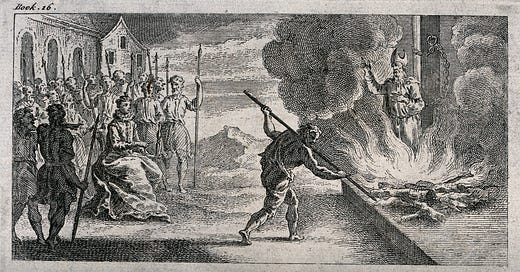Even to make this connection is already problematic in a post-religious society where the term “heresy” is associated with the noble and good. Whatever stands in opposition to reactionary theocracy, the thinking runs, stands on the side of freethinking liberalism, to which fascism represents the antithesis.
Nonetheless anyone who has noticed how loosely the word fascist, or similar terms, is now thrown around may also have noticed how rarely this word is defined, the way it is used as a term of abuse, and how it serves as a warrant for social repression. Because historically Fascists and Nazis had no respect for individual rights, and employed political violence against their opponents, the logic goes, anyone who is identified as a fascist may be legitimately subjected to persecution and violence.
But on what basis is it possible to identify a fascist? For many years now, the number of individuals who call themselves fascists has remained very small, and usually far from liberal metropoles. Accordingly, people searching for fascists in their local urban environments are compelled to employ other criteria to expose and discover them. This may include, for example, an interest in the history of fascism, or certain individuals associated with fascism, or things that fascists are said to be associated with, even when some of these things, for example an interest in nature, or beauty, are clearly not essentially fascist, as many non-fascists have been interested in them too.
Here we encounter a paradox since some of this interest is being generated by the same mechanism which is now searching for fascism. Because the term “fascism” is now both increasingly widespread, and increasingly vague, anyone seeking to know what it is must investigate it in its historical context, and examine what actual fascists believed, and what others, non-fascists, who lived under fascist regimes believed, and therefore whether it is true, as is claimed, for example, that Trump is a fascist or that fascism is now on the rise.
But precisely in embarking upon this inquiry, this group of people now lays themselves open to being accused of fascism, or “substantively vested in fascist ideology” to take an arresting phrase I heard yesterday, from a nominally pro-free speech editor. The line arrived after I pointed out to him that a man who lived under a fascist regime, whose relation to fascism shifted between critique and support, who never joined the party, who denied being a fascist and was at one point accused of being an antifascist, and who, after the war, was acquitted by an Italian court on the charge of glorying fascism, probably cannot be usefully described as simply a fascist.
Which is not to say that his own judgements should not be criticized, even criticized fiercely. But this is the unfortunate other side of the syllogism: when everything that we criticize is an image of fascism, so that fascism turns into the term which defines what we criticize, we lose the ability to criticize anything else. Thus we trick ourselves into thinking that simply not being a fascist exonerates all other actions, as if cruelty, pride and stupidity was restricted to fascism, instead of potentially anywhere humans are found.
A purely instinctive reaction to the image of fascism, deployed like a label to mark the things we reject, yet which cannot itself be defined or explained, now starts to replace understanding, and repress real intelligence. In order to criticize something, you need to understand what it is, but attempting to understand fascism is now strongly discouraged. It must be instead simply condemned on command, without knowing what we are condemning exactly, beyond the condemned or condemnable. Thus last year, the Tea House Theatre in London arranged a public discussion of Gentile and Mussolini’s The Doctrine of Fascism; evidently a relevant source in any attempt to examine this question. But the event was abusively protested by a group of masked Antifascists, organized by the Socialist Workers Party, and the surveillance group Hope not Hate, on the basis that any discussion of fascism equated to promoting fascism and therefore could not be tolerated by the defenders of tolerance. Here we can see the connection: one cannot just ‘read’ heretical texts, reading them already makes you into a heretic.
Evidently the suggestion that upon hearing the words of a fascist one is instantly converted to fascism is a strange proposition from a secular liberal perspective, while the notion that fascism advances implacably with an increased understanding of it asserts in effect understanding is somehow itself fascist. And this is a theocratic claim, which in imagining fascism, not as a political system, but as a supernatural contagion, reveals liberal society’s increasing crisis of confidence, and lack of faith in itself: a situation that everyone truly committed to the principle of individual freedom must fear.



Several people on the right have noted that the elite universities in the united states were founded by puritanical religious types in order to train preachers. When this is understood, its not strange after all to see the lengths that these kids will go to enforce so called secular liberal perspective. They haven't lost their puritanical roots.